Churchill would have liked to see more British troops in ‘Saving Private Ryan’
In a new book, retired general Richard Dannatt and expert archivist Allen Packwood analyze the Normandy landings on the 80th anniversary, from the perspective of the prime minister’s contribution to the ‘Longest Day’
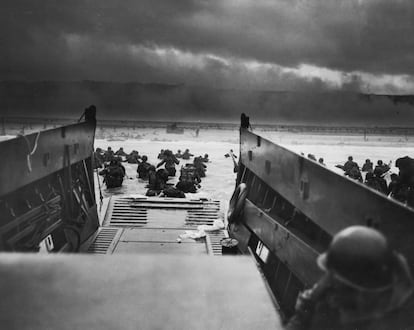

The shadow of the cigar and the bulldog profile of the Longest Day: the book Churchill’s D-Day, by retired British general Lord Richard Dannatt and his compatriot, the expert archivist Allen Packwood, analyzes the Allied landings in Normandy, which took place 80 years ago on Thursday, June 6, through the role played in that key moment of World War II by the then-prime minister of the United Kingdom. In a gripping story — in which the pain of the civilian population and stirring individual adventures are not lacking — full of interesting information extracted from Winston Churchill’s personal archives, the book follows the before, during, and after the invasion of France. It does so with special attention to the doubts and decisions of the British leader, who had been held responsible for the failure of the amphibious campaign in the Dardanelles and the disastrous landings at Gallipoli in World War I (and later for the naval disaster at Narvik at the beginning of World War II). Churchill’s nightmare was that the invasion forces would be trapped on the beaches and decimated. “Do you realize that, when you wake up in the morning, 20,000 men may have been killed?” he said in anguish to his wife Clementine on the eve of D-Day (around 4,000 of the troops who landed on June 6 died, a casualty list far below what was anticipated).
Asked in an interview with this newspaper what they thought of the iconic Saving Private Ryan and its impact on the popular imagination of what was the Longest Day, both authors said the film’s opening sequence “very vividly and accurately” depicts the horrors of the American landing on Omaha Beach. But they add that the film is “a bit fantastical” and barely mentions the British and Canadian effort. “To pretend that Tom Hanks and his band of brothers is the whole vision of D-Day is very restrictive. It wasn’t.” In reality, the British troops landed at Gold relieved the pressure on Omaha, they point out, and prevented a German counterattack on that beach that would have driven the Americans back into the sea. They also recall that the landing at Utah was easier (the casualty figures at Omaha were ten times those of the other beach entrusted to the U.S.). Above all, they stress, “without Churchill having managed to postpone it until conditions were right in 1944, the landing would not have succeeded.” Dannatt notes: “Churchill was very fond of movies, and would have enjoyed Spielberg’s film, but he would have liked to see more British troops in it.”
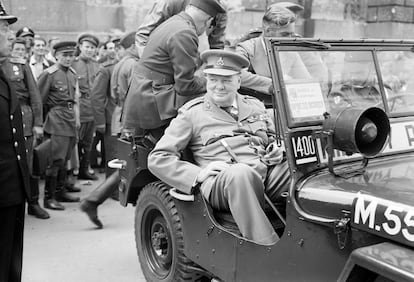
Dannatt and Packwood vindicate the Churchill of 1944, whose role, they point out, is much less known and appreciated than the one he played in 1940, with his famous speeches “we shall fight on the beaches,” “this was their finest hour” and “blood, toil, tears and sweat.” In the end, of course, the British fought on the beaches, but in a different way than they imagined at the time. To the rather widespread opinion that Churchill was reluctant to open a second front in France and hesitated over the invasion, the authors counterpose their criterion that the prime minister acted with the necessary caution before supporting an operation that without adequate preparation could have led to a catastrophic setback. In any case, they note, Churchill’s input “was fundamental to the timing and nature of Operation Overlord.”
Dannatt and Packwood trace the first seeds of D-Day to as early as the evacuation of Dunkirk (due to the excellent planning of the operation) and trace the long, bumpy road to the eventual invasion of Fortress Europe that would include difficult negotiations with Britain’s allies Roosevelt, Stalin, and De Gaulle, trial and error (the Dieppe disaster in August 1942 and the little-known Operation Tiger in April 1944, when German torpedo boats caused enormous casualties to a test force), a detour that would lead to early landings in North Africa and Italy, elaborate deceptions to throw the Germans off the scent and vast amounts of planning. Among the prerequisites for launching the invasion, and of which Churchill was well aware, the authors explain, were controlling the sea and winning the Battle of the Atlantic — especially warding off the German U-boat threat — air domination, amassing sufficient men and material (such as landing craft), and providing troops with experience and morale.
Dannatt and Packwood explain that they both feel a special involvement on this 80th anniversary. The former because he was a colonel in the Green Howards, the same regiment to which Sergeant-Major Stan Hollis — one of the book’s protagonists and the only winner of a Victoria Cross on D-Day for twice charging against German positions — belonged, and because of his involvement with the creation of the Winston Churchill Centre for Education and Learning on Gold Beach, where Hollis fought and where the British Normandy Memorial is located. The Churchill Center, Dannatt explains, will be inaugurated by King Charles III on Thursday, and is intended to help future generations understand what D-Day was “and the role of the British in restoring freedom in Europe.” As for Packwood, whose work on the book culminates 30 years of experience working with Churchill’s personal papers, he recalls that the 80th anniversary of D-Day coincides with the 150th anniversary of Churchill’s birth in 1874. “So it is very pertinent to put the spotlight on the prime minister’s role in the decisions surrounding the landings,” he notes.
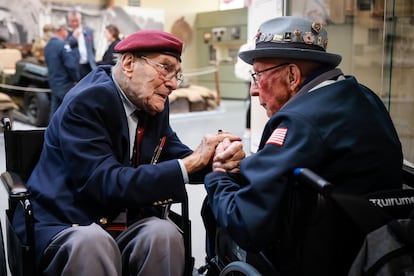
The authors of Churchill’s D-Day stress that obligations to the varied interests of the British Empire — a larger-scale view of priorities — added to Churchill’s prudence in delaying the invasion until 1944 despite the insistence of his allies. “Churchill had the big-picture view of the various theaters and knew that the invasion had to be done at the right time, and that 1942 and 1943 were too soon,” says Dannatt. “Today, knowing what happened, it’s easy to underestimate the level of uncertainty and risk that the invasion of France presented. It was far from clear that it would go well, and if it had failed, the price would have been extremely high, including the political end of Churchill and also serious problems for Roosevelt.” The retired general stresses that failure was a very real possibility, even in June 1944. One uncontrollable factor was the weather, which offered a window of well-taken opportunity on June 6. But there could also have been a security breach that revealed the entire operation to the Germans, something that haunted the British. Or Hitler might not have tied the hands of his Panzer divisions. “There were lots and lots of ways for things to go wrong.” The result would have been — apart from the human and material cost (and the boost to German morale) — not being able to launch a similar operation again until perhaps three years later. Eisenhower himself left an eloquent letter taking responsibility for the failure in the understanding that it could all go very, very wrong.
Packwood says that the wealth of Churchill’s files allows one to see the complexity of the story. He stresses that it was impossible for Churchill to carry out the operation before 1944, nor to take it lightly. “He undoubtedly had the unmitigated disaster of Gallipoli in mind and felt the pressure of previous failures, which fed a fear in him,” adds Dannatt. At the same time, he was aware of the tremendous sacrifice the USSR was making and the need not only militarily but morally to open the second front. There was also a practical consideration: letting the Soviets win the war carried enormous political implications.
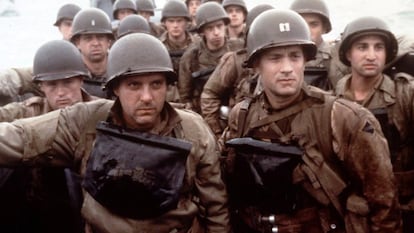
Would the Allies have won the war without the Normandy landings? “Yes,” agree the two authors, although it would have required more time, and would have left the Soviets in a stronger position. “Churchill and Roosevelt knew that it was necessary not only to defeat the Germans but to put a stop to possible Soviet expansion in Europe, and that required the invasion of France, something the prime minister had also promised,” says Dannatt. Churchill was very sensitive to Stalin’s doubts about the courage of the British. And there is another element, he adds: “The delay in ending the war meant that Hitler could go ahead with the Holocaust, the extermination of the Jews, which the Allies knew about. It was imperative to shorten the timetable to the unconditional surrender of Nazi Germany.”
Churchill was not only concerned about military losses; he was also obsessed with civilian casualties from Allied bombing and the possibility the French population might turn against the invaders.
Regarding the importance of morale and courage in relation to what it was like to land on the beaches on D-Day, Dannatt, who has commanded troops in combat, notes that personal courage and the will to do one’s duty are essential, and were essential, that long day. He recalls that Napoleon said that, comparatively, a soldier’s morale is worth three and his physical strength one. “But without a good operational plan, weapons, and resources, bravery is not enough,” he adds.
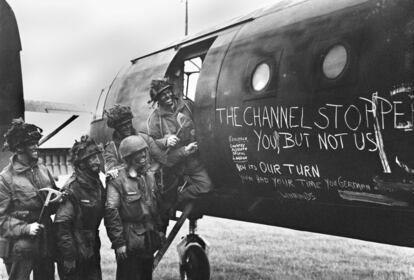
In their book, the authors, who recall that the landings were only the beginning of a few key days and weeks that included moments of great uncertainty and huge battles, give attention not only to the infantrymen, glider pilots, and paratroopers involved in the invasion, but also to the role of women on D-Day. They were key in many areas, they say. There is the case of Christian Oldham, a member of the Women’s Royal Naval Service, recruited to analyze the maps of Normandy and who was privy to one of the best-kept secrets of the war: the locations of the landing beaches. Or that of Joan Bright, employed in a clandestine unit of the secret intelligence services, who was in charge of planning acts of sabotage and then served as director of a special information center for commanders. And war correspondents like Virginia Cowles. One of Churchill’s daughters, Sarah, worked in the RAF’s photographic interpretation unit and analyzed photos of V-1 launch ramps. Hitler was still looming like the eye of Sauron at the beginning of the end, which would still cost much blood, toil, tears and sweat.
Sign up for our weekly newsletter to get more English-language news coverage from EL PAÍS USA Edition
Tu suscripción se está usando en otro dispositivo
¿Quieres añadir otro usuario a tu suscripción?
Si continúas leyendo en este dispositivo, no se podrá leer en el otro.
FlechaTu suscripción se está usando en otro dispositivo y solo puedes acceder a EL PAÍS desde un dispositivo a la vez.
Si quieres compartir tu cuenta, cambia tu suscripción a la modalidad Premium, así podrás añadir otro usuario. Cada uno accederá con su propia cuenta de email, lo que os permitirá personalizar vuestra experiencia en EL PAÍS.
¿Tienes una suscripción de empresa? Accede aquí para contratar más cuentas.
En el caso de no saber quién está usando tu cuenta, te recomendamos cambiar tu contraseña aquí.
Si decides continuar compartiendo tu cuenta, este mensaje se mostrará en tu dispositivo y en el de la otra persona que está usando tu cuenta de forma indefinida, afectando a tu experiencia de lectura. Puedes consultar aquí los términos y condiciones de la suscripción digital.








































